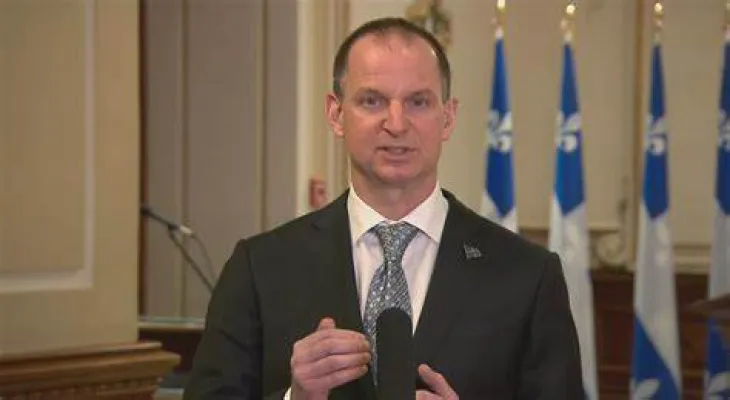Search here
Newspaper
Search here

Arab Canada News
News

Published: November 7, 2023
With the significant slowdown in economic growth, Quebec intends to adopt a new approach to pressing social issues such as food insecurity and the housing crisis, Finance Minister Eric Girard announced in an economic update on Tuesday.
The Ministry of Finance expects a deficit of $4 billion for the 2023-24 fiscal year, with a gradual return to a balanced budget by 2027-2028.
Girard said, "The situation is very difficult for the people of Quebec." He added, "We are not in a recession, but we are definitely in a difficult period that can be described as a downturn."
While the Coalition Avenir Québec (CAQ) government will not send checks to Quebec families as it did in the past to help combat inflation, the mini-budget contains some tax exemptions.
Most spending targets three areas:
First: Housing and homelessness
Quebec will spend $1.8 billion (half of it federal funding) over six years to build 8,000 social and affordable housing units.
Of this amount, $1.6 billion will be used to build 7,500 housing units for low- and middle-income families, and $225.2 million will be used to build 500 units dedicated to the homeless, under Quebec's affordable housing program.
Quebec has also allocated $338.2 million over five years to address the homelessness problem.
Additionally, $123.7 million has been earmarked for emergency assistance related to homelessness as well as culturally safe services for Indigenous people experiencing homelessness.
Based on the latest census between 2018 and 2022, the number of people who were homeless jumped significantly by 44 percent, from just under 6,000 to about 10,000.
While Quebec Party leader Paul Saint-Pierre Plamondon welcomed some measures, especially those related to food banks, he says the CAQ government "has kept its head in the sand for too long" when it comes to the housing crisis and criticized the absence of a plan to help first-time homebuyers.
He said, "Home prices have increased by 64 percent since the CAQ party first came to power in 2018.
Saint-Pierre Plamondon said: "An entire generation will not be able to access property because it is simply unaffordable relative to their incomes."
Quebec Solidaire critic Christine Labrie said Quebec needs 10,000 social housing units within two years, "The crisis requires an urgent response and it is clear that the CAQ is in no hurry to use the $1.8 billion ... to help people find housing."
Second: Food bank
With food banks seeking help in light of the increasing number of clients, Quebec will provide five food organizations with a targeted one-time injection of $20.8 million to assist. The funding will be distributed as follows:
$10 million to the Quebec food bank network.
$5 million to Breakfast Club of Canada.
$2 million to Tablee des Chefs.
$2 million to the Oloo Foundation.
$1.8 million to La Cantine pour tous.
Third: Climate change
The government will spend $961 million over the next five years to adapt to climate change.
This includes $404 million to support communities affected by the devastating wildfires this summer, and $292 million to support the forestry industry and encourage climate change initiatives.
Fourth: Closing the wealth gap with Ontario
Girard says the wealth gap between Quebec and Ontario increased from 16.1 percent in 2018 to 13.5 percent in 2022. The plan aims to close it completely by 2036.
With inflation continuing to impact the purchasing power of Quebec residents, the government announced it will spend $2 billion annually on the indexing of tax brackets and social programs such as pension benefits.
Interim Liberal leader Marc Tanguay said the indexing announced by Girard is based on a policy adopted years ago in Quebec.
Tanguay said, "He has nothing new under the sun to announce today." "He keeps his rose-colored glasses on."
Quebec's economic growth expected in 2023 is 0.6 percent. Economic activity is also expected to be lower than the original forecast of 1.4 percent, at only 0.7 percent.
Quebec’s debt-to-GDP ratio (its ability to repay debt) is expected to be 37.9 percent as of March 31, 2024. By comparison, the ratio in Canada is over 60 percent and the United States over 120 percent. Girard said the goal is to reduce the ratio to 30 percent by 2037-2038.
Comments